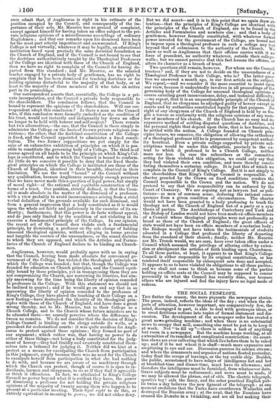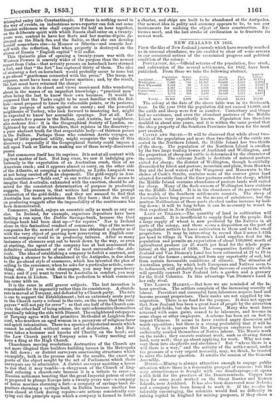THE SOCIAL PENELOPE.
THE flatter the season, the more piquante the newspaper stories. The press, indeed, reflects the ideas of the day ; and when the ob- jects of attention, however important, are comparatively few, the mind, disengaged in part, is able to deal with grotesque ideas, or to erect fictitious notions into topics of formal statement and dis- cussion. The development of the newspaper order has created a great news-grinding machine ; and when there is no substantial news to occupy that mill, something else must be put in to keep it at work. Not "to fill up "—there is seldom a lack of anything but room in a newspaper. But the machine keeps working, at all extremities of its ramified and complicated construction : its count- less claws are ever collecting that which lies before them to be raked up ; and if it be not wheat it is chaff—much more expansive and crepitating to eye and ear. Discussion pursues its solemn stream; and where the armaments and argosies of nations floated yesterday, today float the scraps of leavings, or the toy, cockle ship. Besides, the public, accustomed to have relays of intelligence hot and hot at breakfast-time and dinner-time, must have its allowance ; and therefore the intelligence must be furnished, from whatsoever data. Grave subjects must be rediscussed ; and news must be made, if we may be allowed the phrase, out of olds. The electric telegraph, sportive toy ! aids the fancy, and the sober practical English pub- lic twice a day believes the new figment of the telegraph : at one moment credulous that the Turks have overthrown Wallachia and destroyed the Russian army ; at the next, that the Russians have crossed the Danube in a twinkling, and are all but making their triumphal entry into Constantinople. If there is nothing novel in the way of events, an industrious news-reporter can fish out some Russian nobleman who shall expatiate for half an hour together, ea the deliberate spirit with which Russia shall enter on a twenty- years wart content to have her fleets and her marine-depets de- stroyed on the Black Sea and the Baltic, so that she can develop herself somewhere else-in Moscow or Siberia-and console her- self with the reflection, that when property is destroyed on the shores of Russia "English capital" will suffer.
This Quixotic plan of opening a twenty-years war with the Western Powers is scarcely wider of the purpose than the newest report from Cuba-that seventy persons on horseback have stormed a fort, and that "the fort" has captured thirty of them. The idea of storming a fort on horseback would probably occur to none but a go-ahead "gentleman connected with the press." The troop, we suppose, must have been one of horse marines ; and, by the result, the fort must have returned the charge !
Science sits in its closet and views unscienced folks wandering about in the mazes of an imperfect knowledge ; "practical men" often being the last to know their own business. It would be supposed that the Turks ought to be most familiar with the Bal- kan-most prepared to know its vulnerable points, or its posterns, for the purpose of sortie against an enemy ; and the powerful neighbours of Turkey, who look forward to mastering her, might be expected to know her accessible openings. Not at all. Tur- key counts five passes in the Balkan, and Austria, her neighbour, also reckons five : it is the Geographical Society of London, en- lightened by one of its travellers, that rejoices in the discovery- a pure abstract truth for that respectable body-of thirteen passes in the Balkan. Perhaps those who condemn Arctic voyages, as being of little practical utility, might recognize the value of this discovery ; especially if the Geographical Society could impose a toll upon Turk or Tartar on making use of these newly. discovered passes. But commerce itself has its caprices. It is not at all content with jog-trot matter of fact. Not long since, we saw it indulging gra- tuitously in the expectation of an Australian crash, then of an American crash ; and it appears almost as sorry, on the other side of the Atlantic, at escaping a catastrophe, as Lydia Languish was at not being carried off in an elopement. The gold-supply in Aus- tralia continues-" holds out," as one writer says ; for he seems to imagine that Australia, exhausted with the exertion, should be ad- mired for the consistent determination of purpose in producing nuggets. The reason is, that writers had presumed the prompt exhaustion of the gold-fields ; and they are amazed to find that Australia has more persistence than they have ; that she will go on producing nuggets after the impossibility of the continuance has been demonstrated.
Commerce, indeed, enjoys an eccentric sally as much as any one else. In Ireland, for example, sagacious depositors have been making a run upon the Dublin Savings-bank, because the Cork Savings-bank had been shut up-" for repairs." Nor is Ireland alone in this fantastical conduct of commerce. One of the newest companies for the newest of purposes has obtained a charter as if with the very object of proving how persevering an English com- mercial company could be in producing failures. After so many instances of steamers sent out to break down by the way, or even at starting, the agent of the company has at last announced the definitive abandonment of one of the most successful-the Ade- laide. The idea of establishing a company to forfeit a contract, and building a steamer to be abandoned at the Antipodes, is due alone to the go-ahead style of commerce, which has invented the plan of selling to the consumer, when he asks for a particular article, some- thing elike. If you wish champagne, you may buy gooseberry wine ; and if you want to travel to Australia in comfort, you may break doWn in Lisbon. That is the perfection to which commerce has come with us.
It is the same in still graver subjects. The last invention is remarkable for its ingenuity rather than its consistency. A church- rate is moved at Torquay, and defeated by a Church party. The rate is one to support the Establishment ; but an extremely acute party in the Char& carry a refusal to the rate, on the score that the rate- payers" will not pay for error " : so that one half of the Church con- victs the other half of being schism, the anti-schismatics themselves practically taking the side with Dissent The enlightened ratepayers at Torquay agree with that primitive Methodist at Leighton Buz- zard, who murders an aged woman in a paroxysm of religious furor and spirit intoxication. There is a species of hysterical mania which ' cannot be satisfied without some act of destruction. Abel Bur- rows takes a hammer and knocks old Charity on the head ; and the Low Church party at Torquay seize a Vestry meeting and have a fling at the High Church.
Churchmen moving resolutions destructive of the Church are not more illogical than builders building houses in the Metropolis to fall down ; or distriot surveyors sanctioning structures which exemplify, both in the process and in the results, the exact op- posite of the object sought by the act of Parliament which those surveyors are to administer. A district surveyor assisting a house to rise that it may tumble-a clergyman of the Church of Eng- land refusing a church-rate because it is a tribute to error-a Russian nobleman boasting that the great Imperial patron of order is prepared to plunge Europe into a twenty-years war-a company of horse marines storming a fort-a company of savings-bank de- positors storming a savings-bank in Dublin because another has been closed it Cork during repairs-are actions consistently car- rYing out the principle upon which a company is formed to forfeit
a charter, and ships are built to be abandoned at the Antipodes. Our newest idea in polity and economy appears to be, to use our instruments for undoing the object of their construction. Ex- tremes meet, and the last stroke of civilization is to frustrate its newest work.





































 Previous page
Previous page